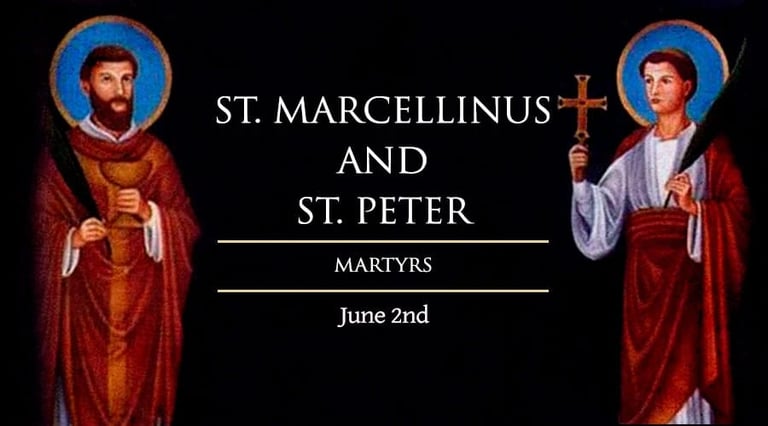Saint of the day June 2, 2025
Saints Peter and Marcellinus
DAILY SAINT
Nirmala Josephine
6/2/20253 min read


On June 2, the Catholic Church remembers two fourth-century martyrs, Saints Marcellinus and Peter, who were highly venerated after the discovery of their tomb and the conversion of their executioner.
Although the biographical details of the two martyrs are largely unknown, it is known that they lived and died during the reign of the Roman Emperor Diocletian. In 302, the ruler changed his tolerant stance and pursued a policy intended to eliminate the Church from the empire.
Diocletian and his subordinate ordered the burning of Catholic churches and their sacred texts, as well as the imprisonment and torture of clergy and laypersons. The goal was to force Christians to submit to the Roman pagan religion, including the worship of the emperor himself as divine.
It was at the mid-point of this persecution, around 303, that a Roman exorcist by the name of Peter was imprisoned for his faith. While in prison, tradition holds that Peter freed Paulina, the daughter of the prison-keeper Artemius, from demonic influence by his prayers.
This demonstration of Christ's power over demons is said to have brought about the conversion of Paulina, Artemius, his wife, and the entire household, all of whom were baptized by the Roman priest Marcellinus.
After this, both Marcellinus and Peter were called before a judge who was determined to enforce the emperor's decree against the Church. When Marcellinus testified courageously to his faith in Christ, he was beaten, stripped of his clothes, and deprived of food in a dark cell filled with broken glass shards.
Peter, too, was returned to his confinement. But neither man would deny Christ, and both preferred death over submission to the cult of pagan worship.
It was arranged for the two men to be executed secretly, in order to prevent the faithful from gathering in prayer and veneration at the place of their burial. Their executioner forced them to clear away a tangle of thorns and briars, which the two men did cheerfully, accepting their death with joy.
Both men were beheaded in the forest and buried in the clearing they had made. The location of the saints' bodies remained unknown for some time, until a devout woman named Lucilla received a revelation informing her where the priest and exorcist lay.
With the assistance of another woman, Firmina, Lucilla recovered the two saints' bodies and had them re-interred in the Roman Catacombs. Sts. Marcellinus and Peter are among the saints named in the Western Church's most traditional Eucharistic prayer, the Roman Canon.
Pope St. Damasus I, who was himself a great devotee of the Church's saints during his life, composed an epitaph to mark the tombs of the two martyrs. The source of his knowledge, he said, was the executioner himself, who had subsequently repented and joined the Catholic Church.
Reflection
Although we know little about the details of their lives, the veneration of these early saints has been widespread, and their names continue to be invoked today every time the Roman Canon is used in the Mass. What is certain is that the courage of these saints in the face of death has inspired countless Christians for many centuries. As Jesus said, “No one has greater love than this, to lay down one’s life for one’s friends” (John 15:13). In many ways, everyone who has been inspired by the martyrdom of Saints Marcellinus and Peter can be considered their friends. Though they died long ago, the “friendship” of their witness endures.
As we honor these martyrs, ponder your own call to lay down your life selflessly for others. Dying to yourself—living sacrificially and selflessly—is no easy task. But when the grace of God is alive in your life, you will discover that you are given the courage you need to be a witness to Christ. Pray for the same courage that Marcellinus and Peter had, so that your sacrificial love will make you friends to others who need your witness.
